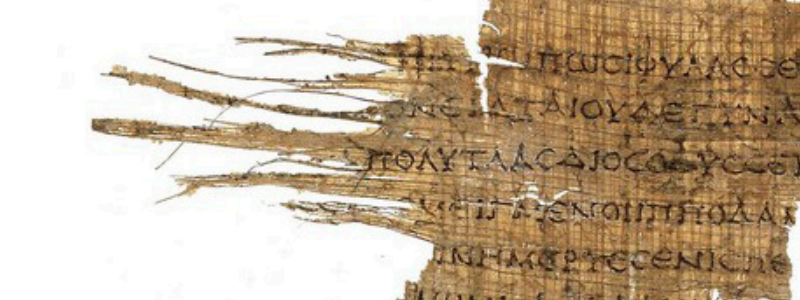One and Many Iliads

Papyrus fragment of The Iliad. Book 10, second century BCE.
How much of Homer is there in Denis O’Hare and Lisa Peterson’s adaptation, An lliad?
The inspiration for An lliad originated from theatre director Lisa Peterson’s interest in developing a play about war. Teaming up with actor Denis O’Hare (a Broadway, film, and TV actor who was last seen on Court’s stage during the 1990/91 season), Peterson turned to Western civilization’s first war story: Homer’s lliad, an epic poem about the mythical ten-year Trojan War. Reading aloud from the Robert Fagles translation of the poem—a popular translation admired for its liveliness and contemporary idiom —O’Hare would then explain, extemporize, and elaborate on the story in his own words. Peterson recorded these digressions, many of them improvised, and together, the two assembled a multi-layered script using O’Hare’s words, Fagles’s translation of Homer, and even some of Homer’s Ancient Greek. Originally, Denis O’Hare intended to play the role of The Poet with Lisa Peterson directing; however, when their mutual schedules postponed that production, Peterson directed productions at Seattle Rep and McCarter Theatre Center with different actors. Peterson and O’Hare generously allowed Court Theatre to produce the Chicago premiere of An lliad in 2011 with its own actor-director team. (O’Hare and Peterson finally got the opportunity to mount An lliad together in February 2012 for a production at New York Theatre Workshop.)
The insight required to gracefully consolidate Homer’s lliad into a single night of theatre is formidable: Homer’s poem contains over 15,000 lines of verse, divided into 24 “books” (it would take roughly twenty-four hours to speak the entire poem out loud). Fortunately, Homer himself was an excellent dramatist—rather than tell the entire ten-year history of the Greek siege of the city of Troy, he limited the story of The lliad to only a few weeks in the last year of the war, focusing on the drama of the Greek warrior Achilles, his dispute with Agamemnon, and his defeat of the Trojan general Hector. Many of the most iconic details we associate with Homer’s lliad didn’t actually originate from the poem. The story of the Trojan Horse and the fall of Troy is told not in The lliad but in The Odyssey. The story of Achilles’s heel was invented by poets and tragedians long after Homer. Even the story of Helen of Troy’s kidnapping by Paris is only alluded to indirectly (and the famous line, “The face that launched a thousand ships,” is from Christopher Marlowe, not Homer). Homer’s poem begins with the rage of Achilles and ends with the burial of Hector. It was this dramatic unity that prompted Aristotle to call Homer the epic poet who most resembled a tragedian, and An lliad draws on this fundamental feature to dramatically flesh out the confrontation between Achilles and Hector.
At least one other aspect of An lliad is true to its source material: the fact of its oral performance by a single performer. While modern readers are fortunate enough to possess a singular text of Homer’s lliad, the poem was orally transmitted for many hundreds of years before it was finally written down. Scholars today conceive of The lliad as a poem that a bard would have performed through both memorization and improvisation (much like An Iliad’s Poet); the performer would have been equipped with certain “formulas” that he could freely rearrange from night to night, depending on the audience. Lisa Peterson and Denis O’Hare have captured in their adaptation a modern understanding of the immediacy and liveness of those ancient Homeric performances. As a result, An lliad is in dialogue with not only the content of its source material, but also its form, presuming correctly that Homer’s lliad is, and always has been, a poem meant to be experienced as an act of live performance.
This article was edited and reproduced from the 2011 program of An Iliad.